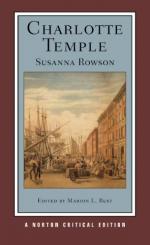When they got without the walls of the prison, Temple thanked his friend Blakeney for introducing him to so worthy a character; and telling him he had a particular engagement in the city, wished him a good evening.
“And what is to be done for this distressed man,” said Temple, as he walked up Ludgate Hill. “Would to heaven I had a fortune that would enable me instantly to discharge his debt: what exquisite transport, to see the expressive eyes of Lucy beaming at once with pleasure for her father’s deliverance, and gratitude for her deliverer: but is not my fortune affluence,” continued he, “nay superfluous wealth, when compared to the extreme indigence of Eldridge; and what have I done to deserve ease and plenty, while a brave worthy officer starves in a prison? Three hundred a year is surely sufficient for all my wants and wishes: at any rate Eldridge must be relieved.”
When the heart has will, the hands can soon find means to execute a good action.
Temple was a young man, his feelings warm and impetuous; unacquainted with the world, his heart had not been rendered callous by being convinced of its fraud and hypocrisy. He pitied their sufferings, overlooked their faults, thought every bosom as generous as his own, and would cheerfully have divided his last guinea with an unfortunate fellow creature.
No wonder, then, that such a man (without waiting a moment for the interference of Madam Prudence) should resolve to raise money sufficient for the relief of Eldridge, by mortgaging part of his fortune.
We will not enquire too minutely into the cause which might actuate him in this instance: suffice it to say, he immediately put the plan in execution; and in three days from the time he first saw the unfortunate Lieutenant, he had the superlative felicity of seeing him at liberty, and receiving an ample reward in the tearful eye and half articulated thanks of the grateful Lucy.
“And pray, young man,” said his father to him one morning, “what are your designs in visiting thus constantly that old man and his daughter?”
Temple was at a loss for a reply: he had never asked himself the question: he hesitated; and his father continued—
“It was not till within these few days that I heard in what manner your acquaintance first commenced, and cannot suppose any thing but attachment to the daughter could carry you such imprudent lengths for the father: it certainly must be her art that drew you in to mortgage part of your fortune.”
“Art, Sir!” cried Temple eagerly. “Lucy Eldridge is as free from art as she is from every other error: she is—”
“Everything that is amiable and lovely,” said his father, interrupting him ironically: “no doubt in your opinion she is a pattern of excellence for all her sex to follow; but come, Sir, pray tell me what are your designs towards this paragon. I hope you do not intend to complete your folly by marrying her.”




